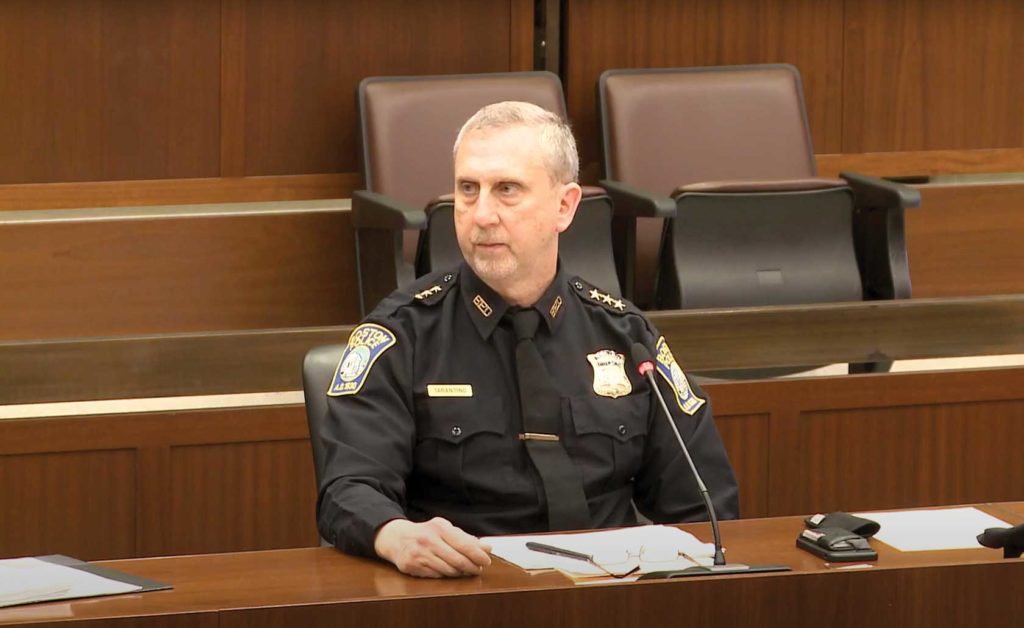
As the city’s budget process continues, the Boston Police Department has now had its first turn at scrutiny by City Council members who, during nearly six hours of questioning, focused their attention on issues of staffing, overtime and department procedures in an effort to better understand Mayor Michelle Wu’s proposed $396 million dollar budget allocation.
Announced by Wu as part of her nearly $4 billion overall budget, the BPD’s allocation represents a year-over-year decrease of about $4.26 million, or 1.1%. The allocation is being closely combed through by city councilors whose constituents have in the past few years called for deep budget cuts in the wake of high-profile law enforcement misconduct across the country.
Police brass were given an opportunity last Wednesday to present a brief overview of their functions and to highlight important critical budget line items including investments into capital projects such as the new East Boston station set to be completed this summer, and technology improvements such as body cameras. Other capital projects include studies to assess space and capacity for various other stations, a study of the viability of a backup 911 call center and an upgraded forensics facility.
The department’s needs for staff, especially trained officers, figured prominently during questioning from the councilors. Several of the councilors, including Ways and Means Committee Chair Tania Fernandes Anderson, Kenzie Bok and Riccardo Arroyo, asked about the number of officers needed to properly address the city’s crime, how those needs are being met and why it appears officers are having to work extreme amounts of overtime.
According to BPD Bureau of Field Services Deputy Superintendent James Tarantino, the minimum staffing level for the department is 1,044 officers. Currently, the department has 735 field officers, excluding hundreds of detectives and other special units, officers in other bureaus and the more than 300 officers unavailable due to injury or some other extenuating circumstance.
Police data showed double-digit decreases in major categories of crime and arrests declining over a multi-year period. Despite this, BPD says it needs to increase its staffing in order to “prevent and reduce crime and violence” and have an “efficient response to crime and calls for service” as well as “support employee health, wellness and safety.”
Currently, to address department needs, Tarantino said, officers are being asked to work shifts as long as 16 hours continuously, spreading overtime hours out across field officers. BPD’s Bureau of Administration and Technology Chief Lisa O’Brien supplemented Tarantino’s assessment by adding that the department is expected to log nearly 897,000 hours of overtime — far outpacing its budgeted 655,000 hours.
Questions arose from councilors on how staffing decisions were made, and how the overtime has gotten so out of hand within BPD. Arroyo, who has repeatedly requested information on how police determine needed staffing levels, said the department has refused to supply the information.
“It’s very difficult for me to understand where the shortages are and how you’re filling them,” he said.
Even the minimum staffing figure — the basis for the department’s hiring justifications — seemed unsupported by evidence.
“If you’re asking for a formula, it doesn’t exist,” Tarantino said Wednesday.
Other questions regarding the potential misuse of time came from the ongoing issue of court proceedings during which officers are asked to deliver evidence or other tasks relating to court. During each visit to court, they receive a minimum of four hours in overtime pay.
Marcus Eddings, the superintendent of details and overtime, told the council his team has been trying to establish relationships with attorneys to find out when cases won’t go forward in order to save on the overtime budget.
“A lot of officers respond to court and then they cancel, and they don’t receive notification of that cancellation.”
As for officers to fill in on the day-to-day needs, O’Brien said they currently have an incoming recruit class of 128 from across the city. She said the newest recruit class set to graduate in December has capacity in multiple languages and represents every Boston neighborhood.
Some, though, do not think this is enough. Council President Ed Flynn was vocal during Wednesday’s hearing about his belief that the city should be hiring officers at a much higher rate to meet its needs.
“It’s my opinion that we need to consistently hire 200 to 300 officers every year to meet these minimum manning levels,” Flynn said.
Flynn’s colleagues were skeptical of this outright endorsement of hiring without seeing better data on the inner workings of staffing decisions, and on what types of calls are coming into the department. There were questions of best practices in who should respond to what type of crime and matters of ongoing reform that will likely impact BPD staffing.
For instance, $1.5 million is being allocated to the Boston Emergency Services Team (BEST), a clinicians co-response team, in order to continue staffing the 12 crisis workers to work alongside officers and to hire one more. The department is currently also looking to hire a supervisor for BEST. Moreover, in the spirit of police reform, BPD is looking to hire multiple positions to support records requests within the department.
Overall, BPD representatives continued to argue to city council that their budget is warranted, despite councilors’ skepticism.
“We need support, and we need bodies,” Superintendent Jeffrey Wolcott said.
Councilors left the meeting last week requesting that BPD supply them with the additional data, as well as continue to be open to additional reforms and innovations that could reduce spending while promoting public safety. The council’s budget process is set to continue through the summer, with department hearings weekly from now until July.






